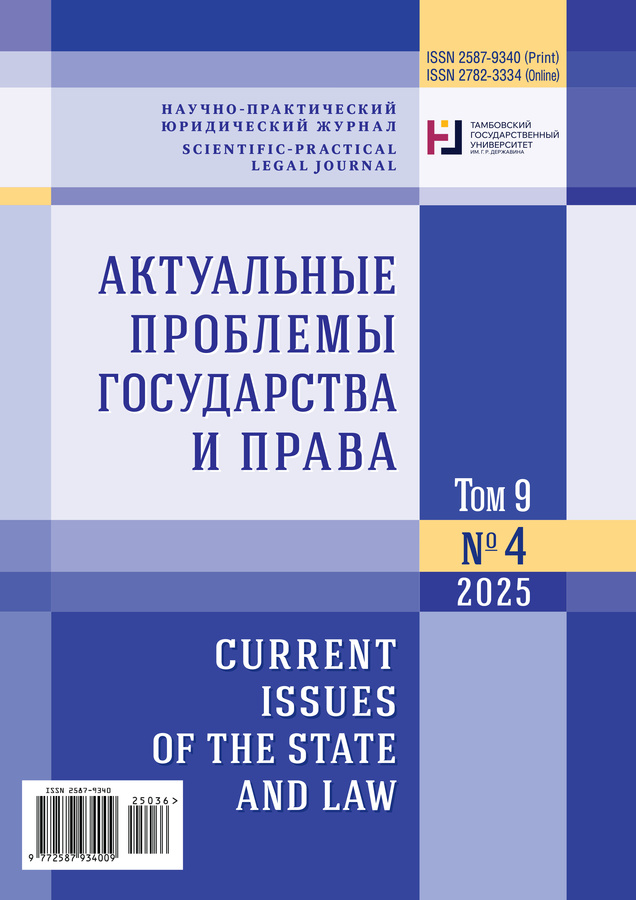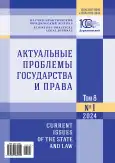Соотношение проектов статей, предусматривающих составы преступлений в сфере незаконного оборота и применения оружия, основанного на новых физических принципах, с действующим уголовным законодательством
- Авторы: АБАСАЛИЕВА Э.Э.1
-
Учреждения:
- ФГБОУ ВО «Дагестанский государственный университет»
- Выпуск: Том 8, № 1 (2024)
- Страницы: 41-53
- Раздел: Материальное право
- URL: https://journal-vniispk.ru/2587-9340/article/view/297186
- ID: 297186
Цитировать
Аннотация
Целью исследования является проведение уголовно-правового анализа статей 355 и 356 Уголовного кодекса РФ, предусматривающих ответственность за оборот и применение оружия массового поражения, выявление особенностей их норм, а также соотношение с проектами статей, включающих в себя составы преступлений в сфере незаконного оборота и применения оружия, основанного на новых физических принципах (ОНФП). Использованы общие и частные научные методы: проведен анализ норм национального и международного законодательства, устанавливающего запрет оборота оружия массового поражения, а также изучены научные подходы ученых в области международного гуманитарного права, международного публичного права и сравнительного правоведения. Доказано принципиальное различие составов преступлений, предусмотренных статьями 355 и 356 Уголовного кодекса РФ, устанавливающих уголовную ответственность за оборот и применение оружия массового поражения и составов преступлений, предусмотренных проектами статей 222.3. и 222.4. Уголовного кодекса РФ о запрете незаконного оборота и применения оружия, основанного на новых физических принципах. Обоснована необходимость их разграничения и, соответственно, целесообразность криминализации преступных деяний, совершаемых с применением оружия, основанного на новых физических принципах. Результаты научного исследования прошли апробацию в ходе проведения Международных научных чтений «Право. Адвокатура. Нотариат», организованных Российской академией адвокатуры и нотариата 19 апреля 2023 г., а также в рамках проведения III Международной научной студенческой конференции «Актуальные проблемы международного права в контексте вызовов поддержанию мира и безопасности», организованной Московским государственным институтом международных отношений (МГИМО) МИД России 25 апреля 2023 г. и других научно-практических мероприятий. Сформулированные в исследовании предложения могут быть использованы в законотворческом процессе, а также при установлении уголовной ответственности в правоприменительной практике действующих уголовно-правовых норм.
Ключевые слова
Об авторах
Элона Энверовна АБАСАЛИЕВА
ФГБОУ ВО «Дагестанский государственный университет»
Автор, ответственный за переписку.
Email: elonaabasalieva@gmail.com
ORCID iD: 0009-0003-3763-4170
соискатель ученой степени кандидата юридических наук, кафедра уголовного права и криминологии
Россия, Российская Федерация, Республика Дагестан, 367000, г. Махачкала, ул. Коркмасова, 8Список литературы
- Абасалиева Э.Э. Научно-исследовательские проблемы в области правоприменительной практики в сфере незаконного оборота оружия, основанного на новых физических принципах // Право и государство: теория и практика. 2023. № 4 (220). С. 259-262. https://doi.org/10.47643/1815-1337_2023_4_259, https://elibrary.ru/vwcyna
- Абасалиева Э.Э. Проблемы реализации законодательства о незаконном обороте оружия, поражающего излучением // ЛОМОНОСОВ-2023: материалы Междунар. молодежного науч. форума. М.: МАКС Пресс, 2023. С. 1-2.
- Абасалиева Э.Э. Совершенствование правотворчества на основе анализа эффективности правовых норм, регулирующих оборот и применение оружия, основанного на новых физических принципах // Российский судья. 2023. № 10. С. 46-50. https://doi.org/10.18572/1812-3791-2023-10-46-50, https://elibrary.ru/qbfugj
- Ворошилов С.Я. Невидимый террор // Красноярская версия. 2009. № 09 (179). 7 с.
- Лозовицкая Г.П. Проблемы противодействия высокотехнологичной и цифровой преступности // Вестник Восточно-Сибирской открытой Академии. 2023. № 50 (50). Ст. 9. https://elibrary.ru/pqgzxh
- Ворошилов С.Я., Лозовицкая Г.П. Оружие, поражающее излучением, как средство совершения преступлений // Труды Академии управления МВД России. 2017. № 4 (44). С. 174-179. https://elibrary.ru/ymidsz
- Савлучинский В.В., Капкович М.И., Савик С.А., Зырянов А.В. Физиологические основы информационно-психологического воздействия. Минск: БНТУ, 2022. 86 с.
- Новицкая Н.П. Техника и технологии изменения человека и проблемы правового обеспечения информационно-психологической (психофизической) безопасности человека в сфере научно-исследовательских разработок // Международный научно-исследовательский журнал. 2020. № 2-2 (92). С. 99-112. https://doi.org/10.23670/IRJ.2020.92.2.054, https://elibrary.ru/huetpn
- Баренбойм П.Д. Электромагнитные бандиты // Адвокатская газета. М., 2014. № 16 (177).
- Почечуева О.С. Электромагнитная пытка // Адвокатская газета. М., 2020. № 23 (328).
- Почечуева О.С. Электромагнитные излучения, намеренно направленные на вас. М.: ЛУМ, 2015. 34 с.
- Невмовенко А.А., Чирков Е.Н. Проблемы использования в органах внутренних дел оружия, основанного на новых физических принципах // Вестник Белгородского юридического института МВД России имени И.Д. Путилина. 2016. № 1 (27). С. 67-70. https://elibrary.ru/vvdmbv
- Гедиев М.Ш., Пыхтин Р.А. Понимание оружия массового поражения // Общество и право. 2011. № 3 (35). С. 194-197. https://elibrary.ru/ookskx
- Курс уголовного права / под ред. Г.Н. Борзенкова, В.С. Комиссарова. М.: ИКД «Зерцало-М», 2002. Т. 5. Особенная часть. 512 с.
- Трикоз Е.Н. Преступления против мира и безопасности человечества: сравнительный и международно-правовой аспекты. М.: Юрлитинформ, 2007. 504 с. https://elibrary.ru/qxhmfv
- Кибальник А.Г., Соломоненко И.Г. Преступления против мира и безопасности человечества. СПб.: Юридический центр Пресс, 2004. 385 с. https://elibrary.ru/tdltlb
- Иногамова-Хегай Л.В. Международное уголовное право. СПб.: Юридический Центр-Пресс, 2003. 493 с. https://elibrary.ru/xsvgjh
- Бикеев И.И. Оружие массового поражения, материалы или предметы, которые могут быть использованы при создании такого оружия, как предметы преступления по российскому уголовному праву // Уголовное право: стратегия развития в XXI веке. М., 2008. 272 с.
- Мельцер Н. Целенаправленное убийство в международном праве. Оксфорд: Изд-во Оксфорд. ун-та, 2008. 524 с.
- Абасалиева Э.Э. Криминологический портрет исполнителя преступлений, совершаемых с применением оружия, основанного на новых физических принципах // Вестник Восточно-Сибирской открытой академии. 2023. № 49 (49). Ст. 2. https://elibrary.ru/bogcym
Дополнительные файлы









